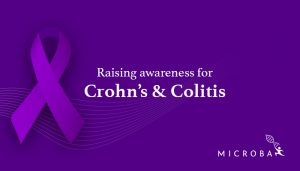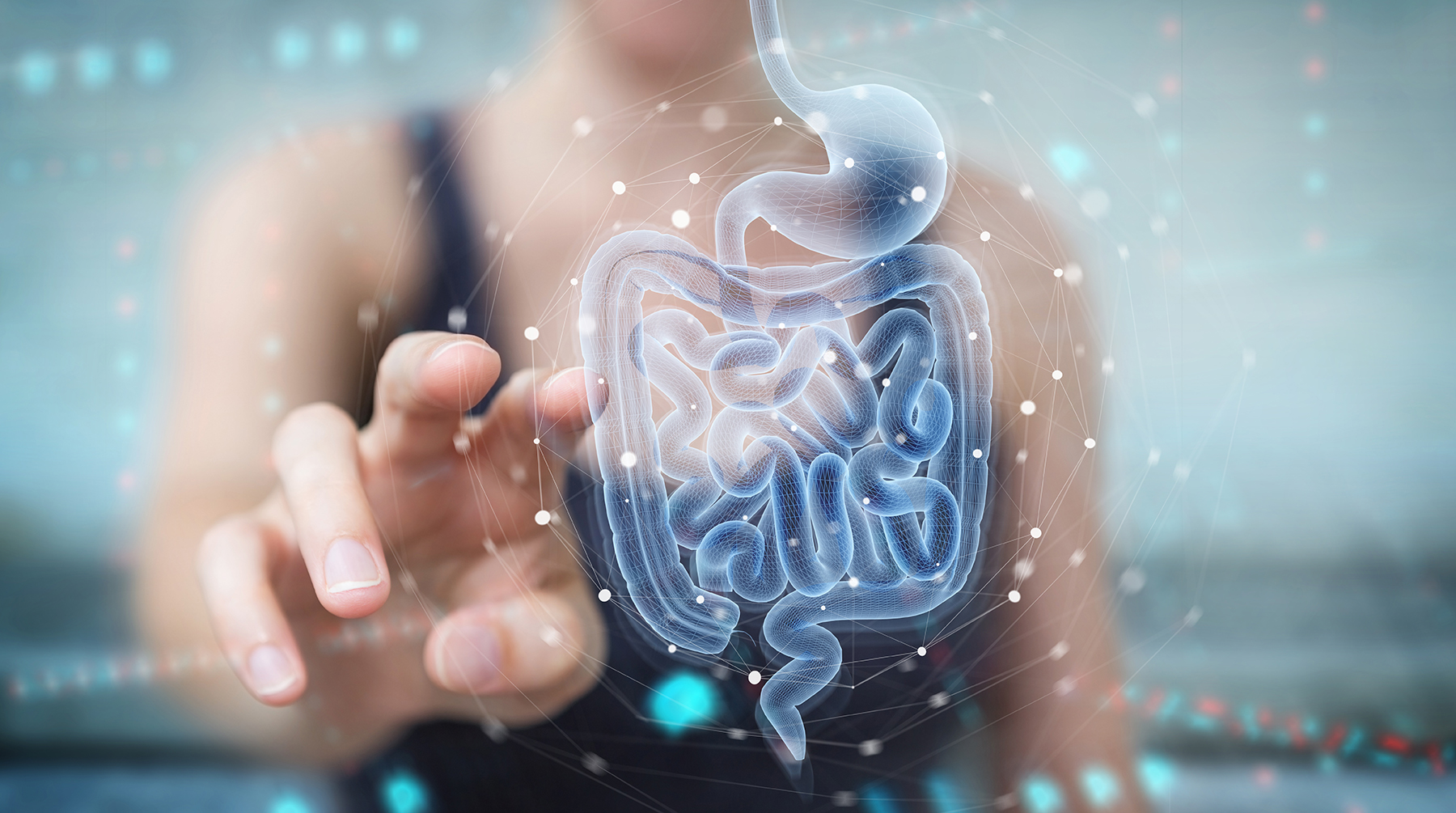The gut microbiome and IBD: what can be discovered?
Authors: Dr Jake Begun, Director IBD, Mater Hospital Brisbane; IBD Group Leader, Mater Research Institute, The University of Queensland
Bianca Maree Harrington, Accredited Practising Dietitian; Lead Microba Microbiome Coach.
29 May 2020
Each year on the 19th May, awareness of Inflammatory Bowel Disease (IBD) is raised in the form of World IBD day. Currently there is no cure for IBD, a debilitating condition that impacts 1 in every 250 Australians1. This equates to over 85,000 people, and alarmingly there are 14 new cases diagnosed every day.
There are two main forms of IBD: Ulcerative colitis and Crohn’s Disease, which most practitioners will be aware of.
Ulcerative colitis generally impacts the mucosae (innermost lining) of the large intestine and rectum and is characterised by the formation of ulcerations1.
Crohn’s Disease commonly impacts the last segment of the small intestine, known as the ileum, and the first part of the large intestine, the caecum. However, Crohn’s Disease can affect any part of the gastrointestinal tract, with inflammation extending into the deeper layers of the intestinal wall2. It is also common in Crohn’s Disease to see normal, healthy tissue between areas of inflammation.
Both forms of IBD can also involve extra-intestinal sites such as the skin and joints, and greatly impact the quality of life for the sufferer, incurring significant costs at both an individual and public health level. While there have been significant advances in the medical management of IBD, up to 40% of patients do not respond completely to available therapies, and the need for surgery to remove portions of the bowel remain common. There is a critical need for therapeutics that will improve the quality of life in a safe and effective way to prolong remission, reduce the need for surgery and number of hospital admissions per patient3.
The link between the gut microbiome and IBD
Over the past decade, there has been an increase in the number of diseases associated with alterations to the gut microbiome, including IBD.
Although the exact causes of IBD are still unclear, it is thought that a combination of factors are involved, namely genetics and environmental factors, such as diet, smoking and infections. These, amongst other factors, can result in alterations in the gut microbiome, which appears to be implicated in the onset of IBD, as well as associated with flares1.
Current research demonstrates that there are measurable differences observed between the gut microbiomes of healthy people and those who have been diagnosed with IBD. These differences include:
- An increased potential to produce the inflammatory substance lipopolysaccharides (LPS)2,3
- Reduced potential to produce the anti-inflammatory short chain fatty acids (SCFAs) butyrate,4,5 and acetate6
- A lower microbial diversity7
- Fewer gut bacteria that break down fibre6.
Microba’s own IBD Research Project has also found different bacterial species in those with and without IBD.
Within person differences are likely when comparing the microbiome when a patient is in remission compared to when they are experiencing a flare.
Loyd-Price et al. (2019) study found alterations to bacterial levels during dysbiosis, which included the depletion of the obligate anaerobes Faecalibacterium prausnitzii and Roseburia hominis in Crohn’s Disease, and the enrichment of facultative anaerobes such as Escherichia coli9.
In terms of metabolites, Loyd-Price et al. found reduced levels of SCFAS, particularly butyrate, were produced during dysbiosis, and an enrichment of the primary bile acid cholate and its glycine and taurine conjugates9.
This study also demonstrated the reduced stability of the gut microbiome in both Crohn’s Disease and Ulcerative colitis, where the microbiome of an individual with IBD may have almost no species in common with itself at an earlier time point9.
Though it is currently unclear which aspects of microbial dysbiosis are causes or consequences of IBD9, further research into this area may help to quantitatively determine how shifts in an individual’s gut microbiome are implicated in the transition between active disease and clinical remission6.
We see a healthier future for the many Australians affected by IBD. Find out how.
IBD and diet – emerging research
A prospective study found that women in the top 20% for fibre intake in their diet were significantly less likely to develop Crohn’s Disease compared with those in the lowest 20%. This suggests that low dietary fibre may be contributing to the onset of IBD in at-risk individuals1.
The fermentation of fibre by our gut bacteria results in the production of short chain fatty acids which help to suppress inflammation. Butyrate, in particular, is a fuel source for the gastrointestinal cells and helps to maintain a healthy gut barrier through the production of a healthy mucus lining and by suppressing local inflammation2.
In February, PubMed published a new paper on IBD, titled Dietary Guidance for Patients with Inflammatory Bowel Disease (IBD) from the International Organisation for the Study of Inflammatory Bowel Disease (IOIBD)3. The paper reviewed available evidence regarding diet and IBD, to provide dietary guidance for practitioners to support their patients that have been diagnosed with IBD.
Specifically, the IOIBD aimed to provide expert opinion regarding the specific dietary components, food groups and food additives that may be prudent to either increase or decrease in the diet to prevent the risk of relapse.
The food groups and dietary components reviewed included fruit and vegetables, red meat, processed meats, pasteurised and unpasteurised dairy, wheat/gluten, fatty acids, FODMAPs, artificial sweeteners, thickeners and emulsifiers.
The key findings from the paper highlight that saturated fats, namely Myristic acid, increased the risk of flare up in individuals with Ulcerative colitis. Omega-3’s also appears to play an important role in reducing the risk of relapse in patients with Ulcerative colitis, specifically in those patients who consumed an omega-3 to omega-6 ratio closer to 1.
The paper also found that it was prudent to increase the consumption of fruits and vegetables in Crohn’s Disease. However, for those patients with strictures, it was recommended they reduce to the intake of insoluble fibre, such as wholegrains and vegetables, to reduce the risk of relapse. In terms of artificial sweeteners and emulsifiers, the advice provided by the IOIDB was to reduce these in both ulcerative colitis and Crohn’s Disease.
For further guidance on the dietary management of IBD, please view the Gastroenterological Society of Australia’s (GESA) guidelines.
Find out more about Microba’s IBD program. Read the article.
Advancements in IBD research
Inspired by the emerging evidence of the links between IBD and the gut microbiome, Microba launched their IBD Research and Development program in 2019. This program is headed up by Dr Páraic Ó Cuív – Lead, Live Biotherapeutics – and Associate Professor Lutz Krause – Head of Data-Mining and Artificial Intelligence.
The aim is to identify the features of the gut microbiome in people without IBD and use this information to develop novel diagnostics and therapeutics that will assist sufferers of IBD. The team use Microba’s world-leading shotgun metagenomics sequencing and data from customers who consent to be part of Microba’s research program to build a rapidly growing genomic database.
So far, this work has identified bacterial species commonly found in healthy individuals but are rarely detected in those with Crohn’s Disease or Ulcerative colitis, or found in low numbers.
Once key bacteria are identified using artificial intelligence from the many samples from customers who have chosen to opt into the research program, the bacterial species is isolated and investigated in the lab for its ability to suppress key inflammatory pathways that underlie the development of IBD. Successful bacterial species will then enter pre-clinical studies to translate these discoveries into effective therapeutics.
Our goal is to develop new microbiome-derived therapeutics that can alleviate active disease, increase disease-free remission periods and prevent progression of disease to more severe states.
Future projects will also look to see if there are certain bacteria in the gut that can help predict which IBD patients will respond to particular therapies. This is important, since currently this process involves some trial and error given the variable response of patients to available therapies.
About the Authors

Dr Jake Begun
Dr Jake Begun completed his MD and PhD in genetics at Harvard Medical School and his gastroenterology training at Massachusetts General Hospital. Dr Begun is the Director of IBD at the Mater Hospital Brisbane and the IBD Group Leader at the Mater Research Institute within The University of Queensland. He is also a member of Microba’s Medical Advisory Board.

Bianca Maree Harrington
Bianca Maree is a specialist Accredited Practising Dietitian and Lead Microbiome Coach at Microba, with an expertise in managing food intolerances associated with Irritable Bowel Syndrome (IBS). She is passionate about furthering our understanding of how the microbiome and other lifestyle factors can impact IBS sufferers, and how an integrative approach is required to better manage this condition.
References
1. PricewaterhouseCoopers Australia (2013) Improving Inflammatory
Bowel Disease Care Across Australia, March 2013, Australia.
2. Crohn’s & Colitis Australia (2020). About Ulcerative Colitis. CCA Website https://crohnsandcolitishub.com.au/about-ulcerative-colitis/ [accessed 7 May 2020]
3. Crohn’s & Colitis Australia (2020). About Ulcerative Colitis. CCA Website https://crohnsandcolitishub.com.au/about-ulcerative-colitis/ [accessed 7 May 2020]
4. van Langenberg, D. R., Simon, S. B., Holtmann, G. J., & Andrews, J. M. (2010). The burden of inpatient costs in inflammatory bowel disease and opportunities to optimize care: a single metropolitan Australian center experience. Journal of Crohn’s and Colitis, 4(4), 413-421.
5. Wen, Z., & Fiocchi, C. Inflammatory Bowel Disease: Autoimmune or Immune-mediated Pathogenesis? Clinical and Developmental Immunology, 11(3-4), 195-204 (2004). Doi: 10.1080/174502520400004201.
6. Vich Vila, Al, Imhann, F., Jankipersadsing, S.A., Gurry, T., Mujagic, Z. Gut microbiota composition and functional changes in inflammatory bowel disease and irritable bowel syndrome. Science Translational Medicine, 10(472) (2018). Doi 10.1126/scitranslmed.aap8914.
7. He, Ql, Gao, Y., Jie, Z., Yu, X., Laursen, J.M. Two distinct metacommunities characterize the gut microbiota in Crohn’s disease patients. GigaScience 6(7) (2017). Doi: 10.1093/gigascience/gix050.
8. Franzosa, E.A., Sirota-Madi, A., Avila-Pachecho, J., Fornelos, N., Haiser, H.J. Gut microbiome structure and metabolic activity in inflammatory bowel disease. Nature Microbiology, 4, 293-305. (2019). Doi: 10.1038/s41564-018-0306-4.
9. Lloyd-Price, J., Arze, C., Ananthakrishnan, A. N., Schirmer, M., Avila-Pacheco, J., Poon, T. W., … & Casero, D. (2019). Multi-omics of the gut microbial ecosystem in inflammatory bowel diseases. Nature, 569(7758), 655-662.
10. Glassner, K. L., Abraham, B. P., & Quigley, E. M. M. (2019). The Microbiome and Inflammatory Bowel Disease. The American Academy for Allergy, Asthma and Immunology, 145(1), 16-27.
11. Ananthakrishnan, A. N., Khalili, H., Konijeti, G. G., Higuchi, L. M., De Silva, P., Korzenik, J. R., … & Chan, A. T. (2013). A prospective study of long-term intake of dietary fiber and risk of Crohn’s disease and ulcerative colitis. Gastroenterology, 145(5), 970-977.
12. Morrison, D.J., & Preston, T. Formation of short chain fatty acids by the gut microbiota and their impact on human metabolism. Gut microbes, 7(3), 189-200. (2016). Doi: 10.1080/19490976.2015.1134092.
13. Levine, A., Rhodes, J. M., Lindsay, J. O., Abreu, M. T., Kamm, M. A., Gibson, P. R., … & Wine, E. (2020). Dietary Guidance for Patients with Inflammatory Bowel Disease from the International Organization for the Study of Inflammatory Bowel Disease. Clinical Gastroenterology and Hepatology.
